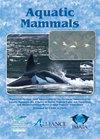Co-Occurrence Between Salmon Farming, Alien American Mink (Neogale vison), and Endangered Otters in Patagonia
IF 0.9
4区 生物学
Q4 MARINE & FRESHWATER BIOLOGY
引用次数: 0
Abstract
The southern river otter (Lontra provocax) and the marine otter (Lontra felina) are endangered species that inhabit Chile. In southern Chile, both species cohabit with the American mink (Neogale vison), an invasive exotic species. The Chilean aquaculture industry has grown exponentially since the late 1980s, with salmon farming taking place from central Chile to the Patagonian fjords and channels. This study assessed co-occurrence between otters, mink, and aquaculture in Patagonia by (1) distributing a survey among workers, fisheries personnel, and aquaculture inspectors concerning observations of otters and mink inside or around aquaculture facilities and outcomes; and (2) a geographical assessment of distribution overlap between known otter territory and salmon farming-registered facilities. We recorded the first anecdotal evidence of interaction, described as co-occurrence, among native otters, American mink, and salmon aquaculture in Patagonia, which varied among seasons and seems to be increasing. We also recorded evidence of difficulty in recognition of the three mustelids among respondents. There is a geographically extended interaction between otters and salmon farms in Chile. The evidence of interaction among alien American mink, native endangered otters, and aquaculture is an early alarm for human–wildlife conflict, and further studies are recommended to ensure native otter conservation.巴塔哥尼亚的鲑鱼养殖、外来美国水貂(Neogale视觉)和濒危水獭之间的共生
南部河獭(Lontra provocax)和海獭(Lontra felina)是栖息在智利的濒危物种。在智利南部,这两个物种与入侵的外来物种美洲水貂(Neogale vison)共存。自20世纪80年代末以来,智利水产养殖业呈指数级增长,从智利中部到巴塔哥尼亚峡湾和海峡都有鲑鱼养殖。本研究通过以下方式评估了巴塔哥尼亚水獭、水貂和水产养殖之间的共生关系:(1)在工人、渔业人员和水产养殖检查员中进行调查,调查内容涉及水獭和水貂在水产养殖设施内部或周围的观察结果;(2)对已知水獭领地和鲑鱼养殖登记设施之间分布重叠的地理评估。我们记录了巴塔哥尼亚本地水獭、美洲水貂和鲑鱼养殖之间相互作用的第一个轶事证据,描述为共存,这种相互作用随季节而变化,似乎正在增加。我们还记录了在应答者中难以识别三种mustelids的证据。智利的水獭和鲑鱼养殖场在地理上有广泛的互动。外来美洲水貂、本土濒危水獭和水产养殖之间相互作用的证据是人类与野生动物冲突的早期警报,建议进一步研究以确保本土水獭的保护。
本文章由计算机程序翻译,如有差异,请以英文原文为准。
求助全文
约1分钟内获得全文
求助全文
来源期刊

Aquatic Mammals
MARINE & FRESHWATER BIOLOGY-ZOOLOGY
CiteScore
1.60
自引率
16.70%
发文量
99
审稿时长
>12 weeks
期刊介绍:
Aquatic Mammals is a peer-reviewed journal sponsored by the European Association for Aquatic Mammals (EAAM), the Alliance of Marine Mammal Parks and Aquariums (AMMPA), and the International Marine Animal Trainers’ Association (IMATA). Aquatic Mammals publishes articles related to marine mammals (whales, dolphins, seals, fur seals, sea lions, walrus, dugongs, manatees, sea otters, and polar bears). Topics of publication on both captive animals and wild marine mammals include aspects of husbandry; behavior; conservation; veterinary medicine; anatomy; physiology; training; population trends; and the effects of pollution, climate change, and noise.
 求助内容:
求助内容: 应助结果提醒方式:
应助结果提醒方式:


